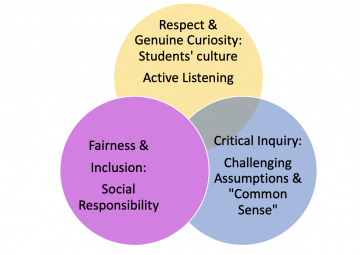Faculty Spotlight
Hyoshin Kim (김 효신), PhD
-
- Instructor, Master of Educational Technology Program

MET Courses
Fun Facts
When I was 5, I experienced my first school failure. I did not pass my kindergarten admission test. ☹
I’ve lived in St. Petersburg, Russia and Alma Aty, Kazakhstan. When I was studying Russian, my teacher gave me a Russian name, Galya.
Sum up your area of research/interest in a tweet (i.e., maximum 280 characters)!
Intercultural Communication Competence, Qualitative Research, Online Learning across cultures, Transformative Learning, JEDI Social Justice, Equity, Diversity and Inclusion
What is your approach to teaching?
My approach to teaching can be summed up as the image below. How do students learn? What are long-term effects of teaching in post-secondary classrooms?

I seek to achieve two goals:- true engagement
- critical reflection and application
The main theme of my teaching philosophy is to strike a balance between:
- Comfort — Intellectual Risk
- Past — Present — Future
- Rigor — Flexibility
- Special — General
- Serious — Fun
- Problem Solving — Problem Posing
- Depth — Breadth
- Individual — Team/Group
- Science — Art
- Why? — Why not?
I believe strongly in creating a sense of community among my students, such that they share ideas, work, and resources with each other, and also share in each other’s personal successes as well as challenges and vulnerabilities. This sense of class room community is particularly crucial for developing leadership skills and fostering inclusive online learning.I strongly believe in being available to my students as much as possible, and will gladly put aside other work if a student reaches out to me; I spend a lot of time with my students (they are spoiled in this regard, given how jealously some of my other colleagues treat their time).
Finally, I aim to inspire a sense of curiosity, self-confidence and active learning. I find it deeply rewarding for me to stimulate and witness personal and professional growth when working with diverse MET students.
What have you learned from teaching in the MET program?
The best part of teaching in the MET program is learning from my diverse students. Their life stories, professional experiences, and their MET journey have been fascinating and invaluable. I enjoyed learning from students who are working as: a Virtual Reality Education developer; a classroom teacher at a school in the Canadian Artic region, Nunavut; an instructor in Saudi Arabia; a Canadian teacher working in China; an Indigenous school administrator in Alberta where schools are incorporating hologram technology to create elders’ story circles, Music teachers who are learning about K-Pop, Punjabi music, and Paw Patrol songs, and many more. It’s been truly exciting and humbling.
What assignment do you most look forward to receiving from your students? Why?
Hmmm, hard to choose just one as I love every assignment. I enjoy “Culture Mapping.” Students provide a brief ‘culture map’ that explores an aspect of behaviour that is considered ‘normal’ within a cultural group or context to which they belong. We ask them to focus on a practice that is very familiar to them, but possibly not to a person of another culture. Examples can range from how to apologize when you are late, how to say no to a party invitation, how to negotiate when making a purchase at a market, greeting, dining, using a public transportation, giving gifts, introductions, etc. . This Culture Map will explain not only HOW to do something appropriately, but WHY that way is appropriate in their culture.
It’s a huge privilege for me to get to know each student and their unique cultural background, layers of identities, beliefs and values, and worldviews. I learned how Canadian Ukrainians prepare special festival dishes, how to greet and chat with Hatians who live in rural villages, how to greet in Pakistan, what to expect at a co-op housing strata meeting, what to do when you are invited to a kitchen party in Nova Scotia, how to behave at a board game convention, what Iranians do to be polite, how to understand the culture of Dabke dance, how to behave as a guide dog trainer, and so on.
I also like the final assignment that asks students to summarize what they have learned from the course and to share some of the highlights and new insights. It’s truly meaningful and rewarding that students are eager to apply some key lessons gained from the course.
What advice would you give to a current or prospective MET student?
I’d like to share some of my favorite quotes/proverbs:
“Don’t bite off more than you can chew.”
“Think in ways you’ve never thought before” (Robert Bly)
“There has never been a time when civilization stood more in need of individuals who are genuinely culture conscious, who can see objectively the social behavior of other peoples without fear and recrimination” (Ruth Benedict, 1935)Images


